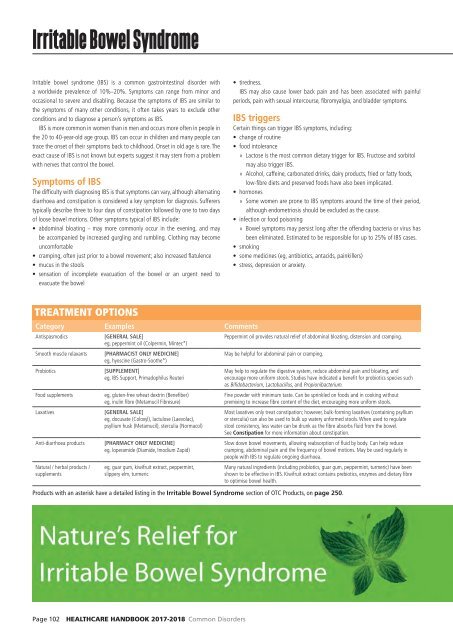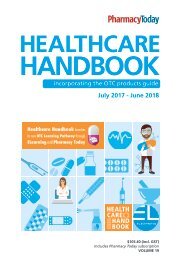2017 HCHB_digital
You also want an ePaper? Increase the reach of your titles
YUMPU automatically turns print PDFs into web optimized ePapers that Google loves.
Irritable Bowel Syndrome<br />
Irritable bowel syndrome (IBS) is a common gastrointestinal disorder with<br />
a worldwide prevalence of 10%–20%. Symptoms can range from minor and<br />
occasional to severe and disabling. Because the symptoms of IBS are similar to<br />
the symptoms of many other conditions, it often takes years to exclude other<br />
conditions and to diagnose a person’s symptoms as IBS.<br />
IBS is more common in women than in men and occurs more often in people in<br />
the 20 to 40-year-old age group. IBS can occur in children and many people can<br />
trace the onset of their symptoms back to childhood. Onset in old age is rare. The<br />
exact cause of IBS is not known but experts suggest it may stem from a problem<br />
with nerves that control the bowel.<br />
Symptoms of IBS<br />
The difficulty with diagnosing IBS is that symptoms can vary, although alternating<br />
diarrhoea and constipation is considered a key symptom for diagnosis. Sufferers<br />
typically describe three to four days of constipation followed by one to two days<br />
of loose bowel motions. Other symptoms typical of IBS include:<br />
• abdominal bloating – may more commonly occur in the evening, and may<br />
be accompanied by increased gurgling and rumbling. Clothing may become<br />
uncomfortable<br />
• cramping, often just prior to a bowel movement; also increased flatulence<br />
• mucus in the stools<br />
• sensation of incomplete evacuation of the bowel or an urgent need to<br />
evacuate the bowel<br />
• tiredness.<br />
IBS may also cause lower back pain and has been associated with painful<br />
periods, pain with sexual intercourse, fibromyalgia, and bladder symptoms.<br />
IBS triggers<br />
Certain things can trigger IBS symptoms, including:<br />
• change of routine<br />
• food intolerance<br />
»»<br />
Lactose is the most common dietary trigger for IBS. Fructose and sorbitol<br />
may also trigger IBS.<br />
»»<br />
Alcohol, caffeine, carbonated drinks, dairy products, fried or fatty foods,<br />
low-fibre diets and preserved foods have also been implicated.<br />
• hormones<br />
»»<br />
Some women are prone to IBS symptoms around the time of their period,<br />
although endometriosis should be excluded as the cause.<br />
• infection or food poisoning<br />
»»<br />
Bowel symptoms may persist long after the offending bacteria or virus has<br />
been eliminated. Estimated to be responsible for up to 25% of IBS cases.<br />
• smoking<br />
• some medicines (eg, antibiotics, antacids, painkillers)<br />
• stress, depression or anxiety.<br />
TREATMENT OPTIONS<br />
Category Examples Comments<br />
Antispasmodics<br />
Smooth muscle relaxants<br />
Probiotics<br />
Food supplements<br />
Laxatives<br />
Anti-diarrhoea products<br />
Natural / herbal products /<br />
supplements<br />
[GENERAL SALE]<br />
eg, peppermint oil (Colpermin, Mintec*)<br />
[PHARMACIST ONLY MEDICINE]<br />
eg, hyoscine (Gastro-Soothe*)<br />
[SUPPLEMENT]<br />
eg, IBS Support, Primadophilus Reuteri<br />
eg, gluten-free wheat dextrin (Benefiber)<br />
eg, inulin fibre (Metamucil Fibresure)<br />
[GENERAL SALE]<br />
eg, docusate (Coloxyl), lactulose (Laevolac),<br />
psyllium husk (Metamucil), sterculia (Normacol)<br />
[PHARMACY ONLY MEDICINE]<br />
eg, loperamide (Diamide, Imodium Zapid)<br />
eg, guar gum, kiwifruit extract, peppermint,<br />
slippery elm, turmeric<br />
Peppermint oil provides natural relief of abdominal bloating, distension and cramping.<br />
May be helpful for abdominal pain or cramping.<br />
May help to regulate the digestive system, reduce abdominal pain and bloating, and<br />
encourage more uniform stools. Studies have indicated a benefit for probiotics species such<br />
as Bifidobacterium, Lactobacillus, and Propionibacterium.<br />
Fine powder with minimum taste. Can be sprinkled on foods and in cooking without<br />
premixing to increase fibre content of the diet, encouraging more uniform stools.<br />
Most laxatives only treat constipation; however, bulk-forming laxatives (containing psyllium<br />
or sterculia) can also be used to bulk up watery unformed stools. When used to regulate<br />
stool consistency, less water can be drunk as the fibre absorbs fluid from the bowel.<br />
See Constipation for more information about constipation.<br />
Slow down bowel movements, allowing reabsorption of fluid by body. Can help reduce<br />
cramping, abdominal pain and the frequency of bowel motions. May be used regularly in<br />
people with IBS to regulate ongoing diarrhoea.<br />
Many natural ingredients (including probiotics, guar gum, peppermint, turmeric) have been<br />
shown to be effective in IBS. Kiwifruit extract contains prebiotics, enzymes and dietary fibre<br />
to optimise bowel health.<br />
Products with an asterisk have a detailed listing in the Irritable Bowel Syndrome section of OTC Products, on page 250.<br />
Page 102 HEALTHCARE HANDBOOK <strong>2017</strong>-2018 Common Disorders



